The Definitive Guide to Conversational CRM
Transform customer relationships with conversational CRM, utilizing AI chatbots for optimizing business outcomes through seamless engagement.

Are you tired of robotic customer service experiences that leave you feeling frustrated and misunderstood?
Imagine a customer relationship management system that focuses on building genuine connections and understanding your unique needs. It is where conversational customer relationship management comes into play.
75% of the customers want the agent to know who they are and their history. Unfortunately, only 31% of the companies retained such information from consumers. Conversational customer relationship management is a customer-centric approach that aims to create meaningful interactions between businesses and their customers.
We’ll explore the key principles and benefits of conversational customer relationship management as well as provide practical tips for implementing the approach in your own business.
Conversational CRM is a strategy that businesses use to engage with their customers through various communication channels in a conversational way. It is a customer-centric approach that leverages artificial intelligence and chatbots to engage with customers in real-time conversations. It focuses on building personalized interactions to forge customer satisfaction.
Unlike traditional CRM systems that often focus on data management and analysis, conversational CRM prioritizes dialogue along with engagement. It leverages artificial intelligence to provide instant responses, gather insights from customer interactions, and enhance the overall customer experience.
Some of the key objectives of Conversational CRM are:
Conversational CRM lets you leverage cutting-edge technology to strengthen customer relationships and drive revenue growth.
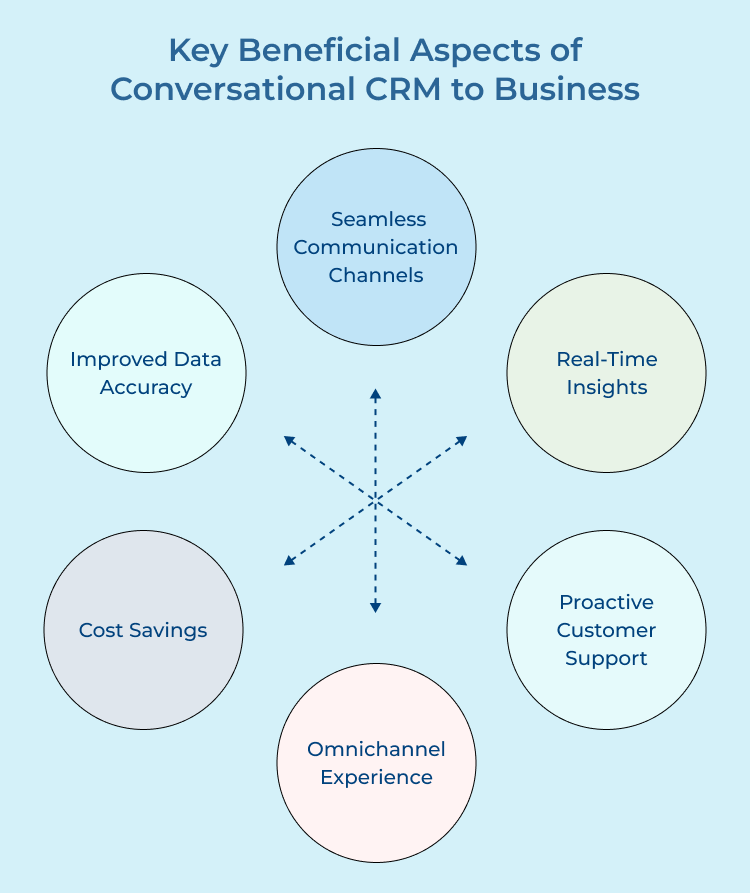
Now that we’ve understood how effective conversational CRM is and how it benefits your business, let’s now delve into how you can implement it in your processes.
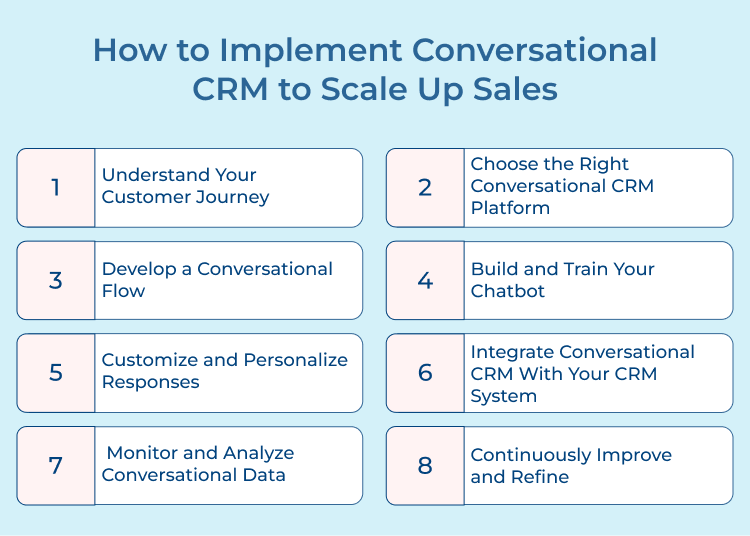
Before implementing Conversational CRM, you ought to have a clear understanding of your customer journey. Identify the key touchpoints and channels where customers interact with your brand. It will help you know and personalize the customer experience effectively.
Consider this:
There are various Conversational CRM platforms available in the market. Conduct thorough research to find the one that aligns with your business requirements. Look for features like natural language processing, chatbots, sentiment analysis and integrations with your existing CRM as well as communication channels.
Consider this:
Designing a conversational flow is essential to ensure a seamless customer experience. Chart out the various customer journey touchpoints and create a logical conversation flow that addresses common queries. It should also provide relevant information. Consider using decision trees or chatbot builders to streamline the process.
Consider this:
Once you have your conversational flow defined, it’s time to build and train your chatbot. Select a chatbot tool that aligns with your CRM platform and offers natural language processing (NLP) capabilities. It will enable your chatbot to understand and respond to customer queries more effectively.
Consider this:
Generic responses leave customers feeling unheard. Customize your chatbot’s responses to align with your brand persona and establish personalized quality connections. Incorporate customer data from your CRM to provide tailored recommendations, product suggestions, or targeted promotions.
Consider this:
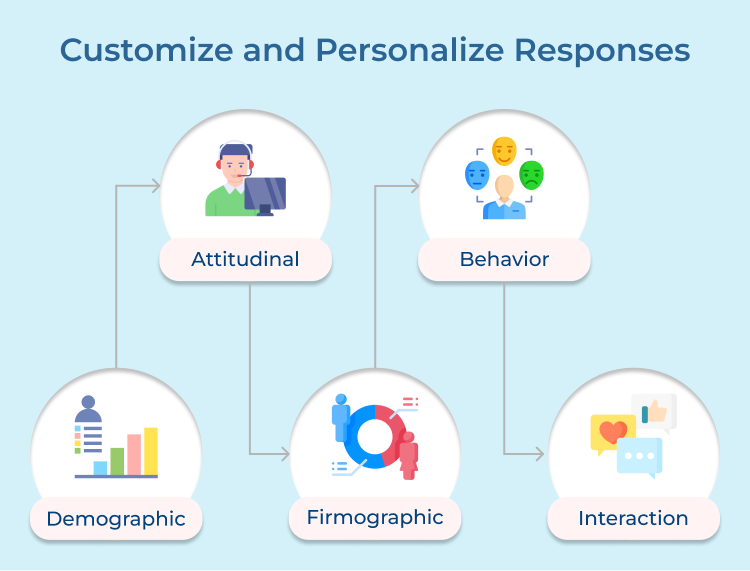
Create a seamless customer experience by integrating your conversational CRM platform with your existing CRM systems. The integration will allow you to capture and store valuable customer data, providing you with a holistic view of each customer’s interactions.
Consider this:
Use the analytical capabilities of your Conversational CRM platform to monitor and interpret customer interactions. Track metrics like response time, customer satisfaction and conversion rates, etc. The data will help you identify areas for improvement as well as optimize your Conversational CRM strategy.
Consider this:
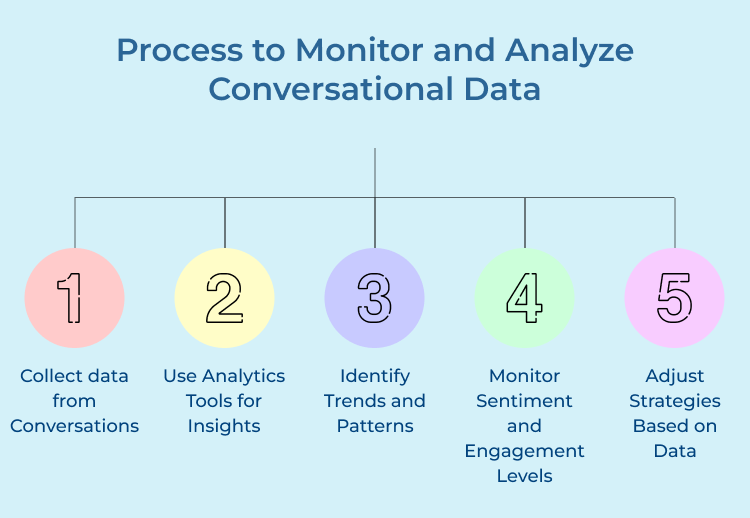
Implementing Conversational CRM is an ongoing process. Review and refine your chatbot scripts, automated responses, as well as overall strategy based on customer feedback along with data insights. Stay updated with the latest trends and advancements in Conversational CRM to continually enhance your sales efforts.
Consider this:
Several software companies have developed conversational CRM software, which combines traditional CRM functionalities with advanced conversational capabilities.
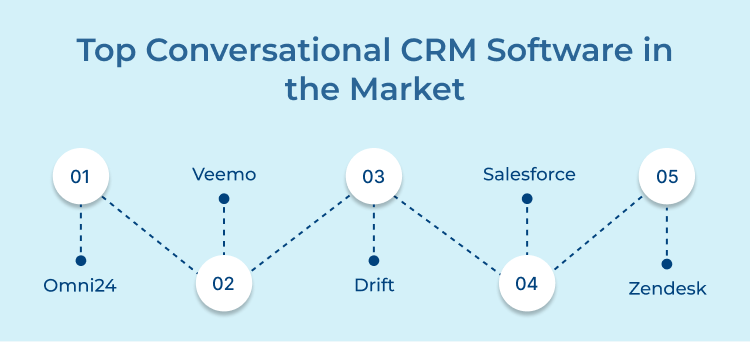
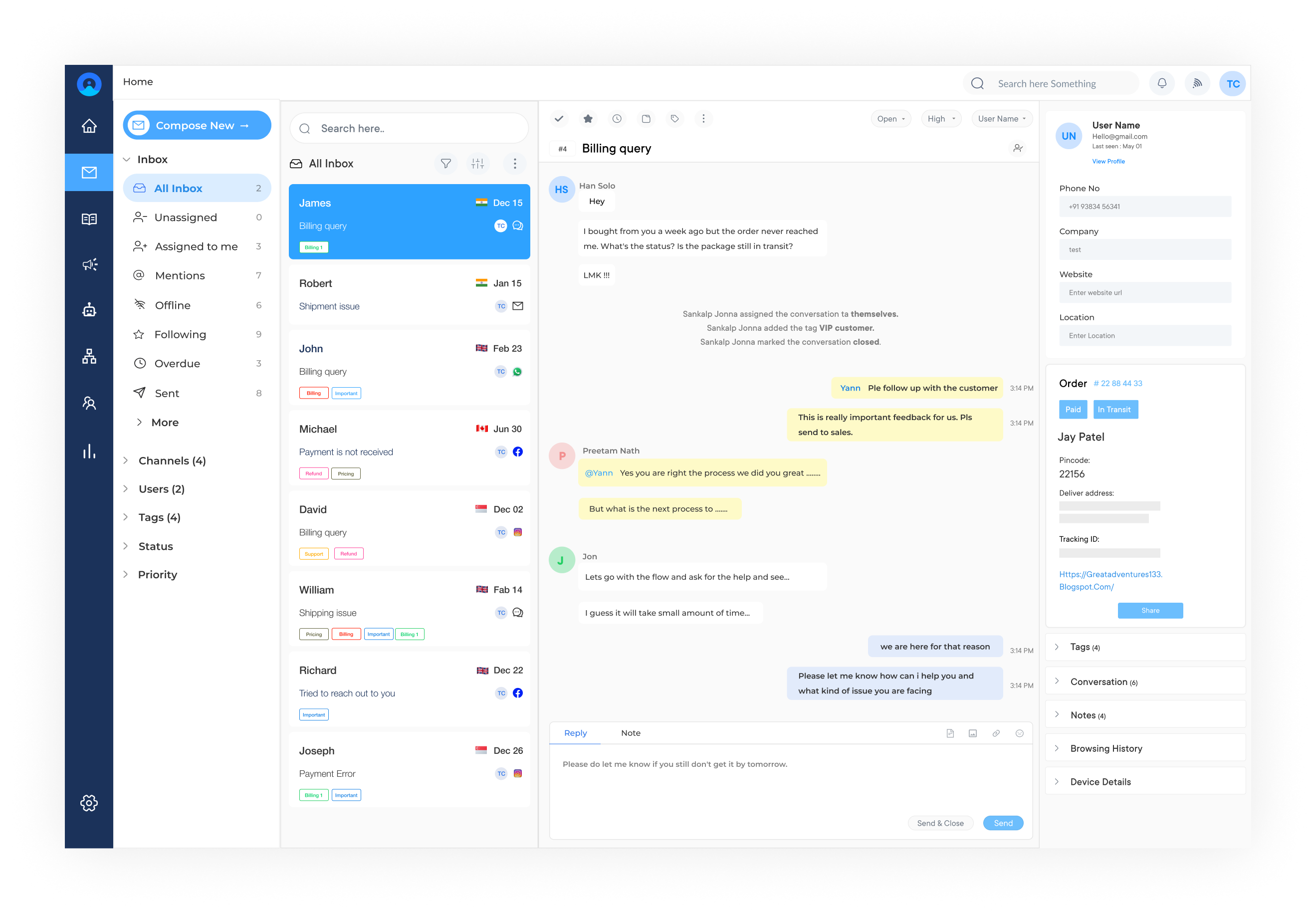
Omni24 is a leading CRM platform that offers conversational tools to help businesses engage with their customers in a more personalized manner. Their conversational CRM software allows businesses to chat with website visitors in real-time, automate follow-up emails and even use chatbots to provide instant customer support. With its user-friendly interface and robust features, Omni24 is a favorite among many businesses.
Features:
Pricing: They offer a range of plans from a basic free plan to Enterprise level plans starting at $29/month. Higher tier plans include additional features such as access analytics, reporting and integrations into many leading platforms like Salesforce, Zapier, Hubspot etc., for SMBs as well as larger ones too!
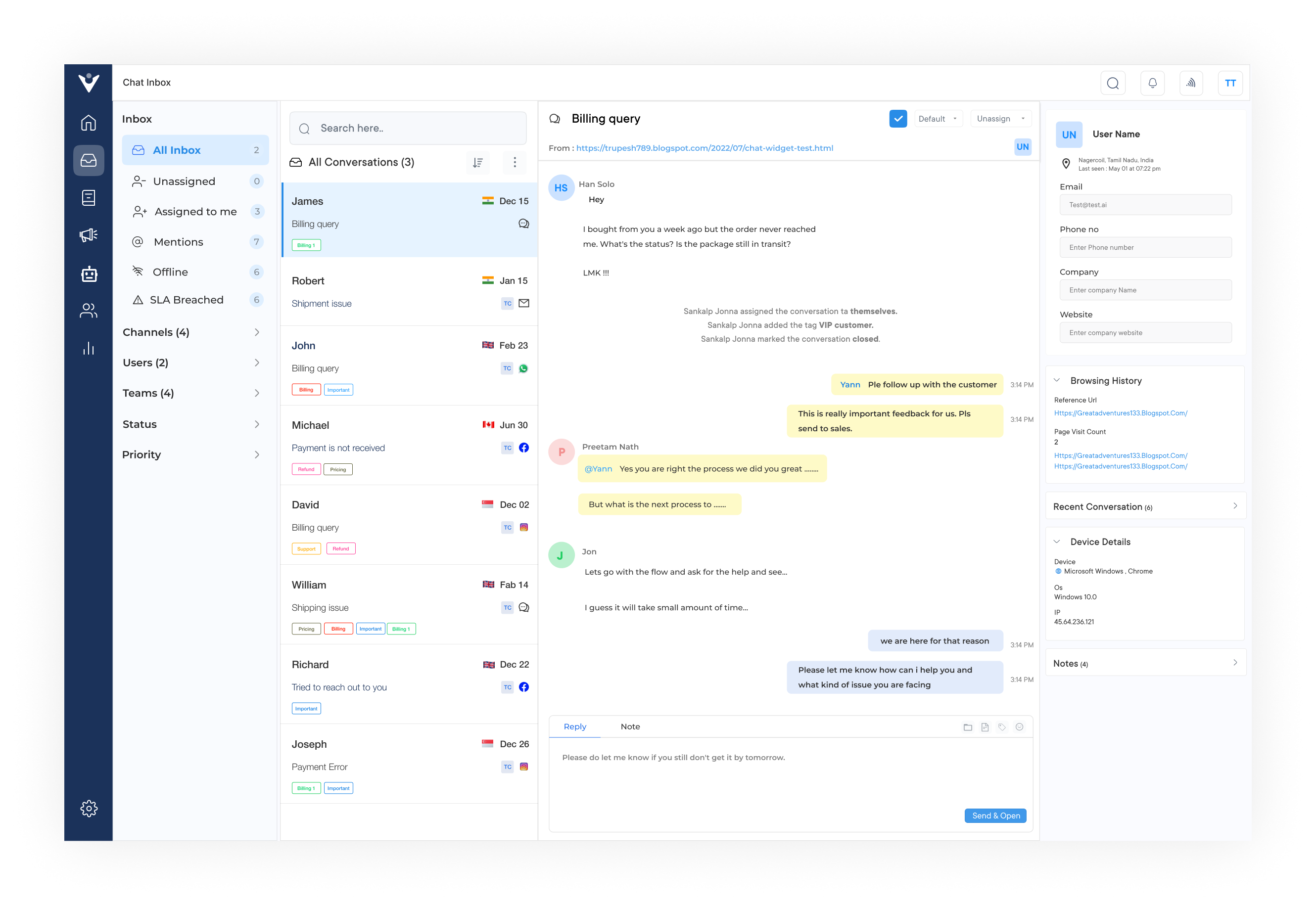
Veemo is another popular conversational CRM software that focuses on providing exceptional customer experiences. With features such as live chat, email marketing automation and AI-powered chatbots, software helps businesses nurture leads, convert them into customers and provide ongoing support. The platform also offers advanced analytics and reporting capabilities to help businesses measure the effectiveness of their customer interactions.
Features:
Pricing: There are three pricing tiers based on the number of staff users, so companies choose whichever works best for them – ranging from $19-299/month depending on the size of your business. Additional add-ons are included in a few packages at different costs, if necessary.
Drift is a conversational marketing platform that helps businesses turn website visitors into qualified leads. With its chatbot as well as live chat features, businesses improve visitor engagement, capture their contact information and guide them towards making a purchase decision. Drift also integrates with other popular CRM systems, allowing businesses to seamlessly manage customer data and interactions.
Features: Provides features such as account-based marketing and chat analytics to drive better customer engagement as well as increase conversions.
Salesforce, a well-known name in the CRM industry, has also embraced conversational CRM. With their Einstein AI capabilities, businesses leverage Salesforce’s chatbot technology to automate customer interactions and provide personalized recommendations. Salesforce’s conversational CRM software enhances customer engagement across various channels, including email, social media and messaging apps.
Features: Salesforce’s AI-powered chatbots help businesses to automate responses to customer queries, provide personalized recommendations and create conversational experiences that feel natural.
While primarily known for its customer support software, Zendesk also offers conversational CRM solutions. With its live chat, chatbot and messaging features, Zendesk enables businesses to provide personalized as well as timely support to their customers. The platform also integrates with other CRM systems, allowing businesses to manage customer interactions and support tickets from a single interface.
Features: The software also provides real-time analytics and reporting, enabling businesses to assess the effectiveness of their conversational interactions as well as make data-driven improvements.
Traditional CRM systems have been widely used for several decades, but in recent years, conversational CRM has emerged as a more personalized and engaging approach to CRM.
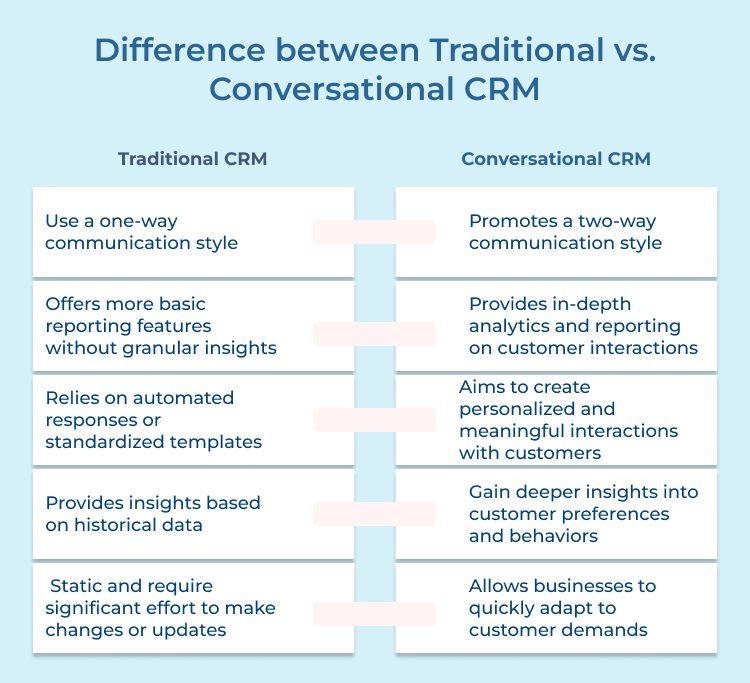
Traditional CRM systems use a one-way communication style, where businesses send out marketing messages or follow-up emails to customers. However, conversational CRM promotes a two-way communication style, allowing businesses to engage in real-time conversations with customers through chatbots or live chat.
Conversational CRM provides in-depth analytics and reporting on customer interactions, sentiment analysis as well as customer satisfaction. Traditional CRM often offers more basic reporting features without granular insights into customer conversations.
Traditional CRM often relies on automated responses or standardized templates. Conversational CRM aims to create personalized and meaningful interactions with customers. It leverages chatbots and artificial intelligence to provide instant responses to customer queries, ensuring a higher level of engagement.
Conversational CRM goes beyond this by analyzing real-time conversations, sentiment analysis, and intent detection to gain deeper insights into customer preferences as well as behaviors. Traditional CRM provides insights based on historical data, such as previous purchases or interactions.
Traditional CRM systems are usually static and require significant effort to make changes or updates. Conversational CRM with its agile nature, allows businesses to quickly adapt to customer demands, implement changes in real-time and stay ahead of the competition.
Conversational CRM offers immense potential for businesses to improve customer interactions, boost sales and streamline processes. By integrating chatbots into your CRM system and leveraging their capabilities, you provide instant support, generate leads, personalize marketing as well as optimize customer experiences.
Conversational CRM leverages the latest advancements in technology, particularly in artificial intelligence and natural language processing. It enables businesses to engage with customers through various channels, including messaging apps, chatbots and voice assistants, creating a more interactive customer experience. Embracing conversational CRM will not only enhance customer experiences but also streamline internal processes, contributing to overall business success.
How to Use Conversational CRM to Drive Sales?
Conversational CRM is a modern approach to customer relationship management that leverages the use of artificial intelligence (AI) and natural language processing (NLP) technologies. It enables businesses to engage with customers in real-time, personalized conversations across various channels such as website chatbots, social media messaging and voice assistants. Conversational CRM systems analyze customer interactions, extract relevant data and provide insights to sales teams, helping them nurture leads as well as close deals more effectively.
How is a conversational CRM better than a traditional CRM?
Conversational CRM allows businesses to deliver personalized and timely interactions with prospects, which significantly improve the chances of converting leads into paying customers. By using chatbots or messaging platforms, sales teams engage customers in conversational interactions, answering their queries, recommending products or services and even assisting them with the purchase process. The level of personalized attention helps to build trust, enhance customer experience as well as drive sales.
What is the new generation of conversational CRM?
The new generation of conversational CRM goes beyond basic chatbots. It incorporates advanced AI capabilities, such as natural language understanding and machine learning, to provide more intelligent as well as personalized interactions. These systems analyze customer behavior, predict their needs and proactively engage with them throughout their buying journey.